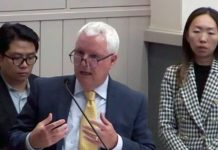The City of South Pasadena’s auditor has prepared a draft giving the city a clean audit for fiscal 2018-19. But in a letter to city management, Rogers, Anderson, Malody & Scott (RAMS) reported findings that included 10 material weaknesses or significant deficiencies in the city’s internal controls and warned others may exist.
“There were quite a few findings,” said RAMS partner Terry Shea, and the clean-up has been slow. He attributed this principally to the effects of covid-19 and to the finance department’s being “short-staffed.” Now that Finance Manager Albert Trinh and Accounting Manager Armine Trashian are in their third year with the city, things should go smoother, he predicted. They were hired during the audit and thrown in with no direction, he said–“baptized by fire. It’s a testament they are still here.”
“We hamstrung our Department going back two years” ago when the Finance Department was wholly reorganized and restaffed, observed Finance Commission Chair Fred Findley.
The audit was reviewed Sept. 24 by the Commission which hoped to get it to the City Council by Oct. 7. But a city official told the South Pasadenan News the draft will now go before the newly-created ad hoc Finance Committee before returning to the Finance Commission, the hope being to present the final audit to the City Council at its Oct. 21 meeting.
Assistant City Manager Elaine Aguilar told the Commission the audit was a draft because the city was awaiting legal compliance letters “that will notify us if there is some large potential impact to the city that we should be aware of.”
Meantime, during a single-agenda special meeting Sept. 28, the Council approved the Commission’s recommendation for the creation of the ad hoc Finance Committee to help the Finance Department resolve its operational problems, get to work on the 2019-20 audit and 2020-21 budget, research policy recommendations for reporting and closing procedures, and consider the need for a forensic audit of the city’s finances from July 2019 to the present. The committee will not be subject to Brown Act public notice requirements.
The Committee is the brainchild of merger-and-acquisition professional Stephen Rossi, who was appointed to the Council Sept. 2 and will serve as one of its two Council members. The other will be Mayor Robert Joe, who reluctantly agreed to the position after other Council members begged off. Finance Commission Chair Findley and Commissioner Ed Elsner will also serve. At its Oct. 7 meeting, the Council will name two members of the community to serve. The applicants must be finance or restructuring professionals in the public or private sector.
The Committee is slated to sunset after six months, though Rossi said he is hopeful everything can get done within 90 days. Nonetheless, he underlined the magnitude of problem by pointing out the draft audit includes year-end adjustments totaling $33 million that were made to the $52 million budget.
“That seems like a very massive number,” commented Finance Commissioner Zhen Tao. “Something was clearly amiss during the year.” Informed that a total of 73 adjustments were made, Findley said that seemed like “large number.” RAMS’ Shea disagreed, saying cities of South Pasadena’s size typically have between 50 and 70 adjustments.
A deficiency occurs when internal controls cannot be relied on to timely prevent or detect misstatements, RAMS explained in its audit. A material weakness is an internal control deficiency or deficiencies “such that there is a reasonable possibility that a material misstatement” will not be prevented.
RAMS identified five material weaknesses in the 2018-19 financial statements. The city failed to ensure timey bank reconciliations; lacked controls resulting in improper recording of capital assets and depreciation; had insufficient staff to ensure proper year-end closing procedures; lacked appropriate segregation of duties among staff; and incorrectly listed multiple employees as eligible for post-employment benefits.
RAMS also identified five significant deficiencies. These were “outdated or nonexistent” accounting policies and procedures; improper grant management; noncompliance with bond debt reporting requirements; making budget amendments without proper approval; and failing to follow policies when signing agreements with vendors and service providers.
RAMS also offered two “observations,” one concerning a lack of documentation for the review of payroll processing and another recommending the city hire a third party at least every five years to do a cost analysis of the fees the city charges and how these are allocated.
“All of these are serious findings that require serious follow-up,” said William Statler, the former president of the California Society of Municipal Finance Officers who co-authored a textbook on local governmental finance and has over 30 years’ experience as a senior municipal finance manager and ten years as a consultant, trainer and author.
Statler was not involved in the audit but agreed to review the RAMS report at the request of the South Pasadenan News. He said the most serious of the findings was the one on late bank reconciliations. Streets and sidewalks can be under- or overvalued, but they don’t go anywhere, he noted. “This is not the case with cash,” which should be reconciled “to the penny quickly” every month.
While RAMS expressed concern over the city’s internal controls, Statler said it is important to note “at the end of the day, they were able to finally resolve these concerns to their satisfaction” and to issue a clean opinion.
But the city needs to move ahead. “The auditors’ findings are a good start, and rather than litigating the past, the focus should now be on a good plan to remediate the findings–and then successfully implement the plan.” He noted that in its response to RAMS, the city generally concurred with the findings and offered a plan of action to respond. All but one of the responses are reasonable, he said. The city has targeted being current on its bank reconciliations by April 2021. “Added one-time resources should be brought to bear to become current much faster than this” he said, and there should be an “adequate allocation of resources on an ongoing basis to keep them current.”
Statler also reviewed former South Pasadena Finance Director Josh Betta’s June 5 report criticizing the city’s financials. One concern Betta raised was the 2020-21 proposed budget’s ending fund balance for 2018-19—and therefore the beginning balances for 2019-20 and 2020-21–had not been audited. This underscored the concern that the 2018-19 ending fund balance was “significantly misstated,” Statler noted. Now that “final” ending numbers are in hand, “an important follow up analysis is how these compare with the estimates in the draft 2020-21 budget.”
He also said the city should include a recap of past audit findings and its response to them so that management knows if the findings are one-time issues or ongoing problems.
RAMS’ 2018 audit found three material weaknesses and four significant deficiencies.
Shea said, “Overall, the city had a good year in fiscal 2018-19.” The General Fund came in $2.26 million above the final budget projection.
However commissioners noted the budget figures used in the RAMS audit did not in fact match the numbers in the budget posted on the city’s website. “Usually we check, but I will have to double check and find out why this doesn’t match,” Shea answered.
Commissioner also raised questions about the absence of several funds from the balance sheet, including the Financial Sustainability Reserve and the half-million-dollar Slater Reimbursement Reserve Funds. “We’ll get back to you on that” Shea responded.
Another question was about why there were $2.3 million in restatements in the fund statements. Those were transfers that “fell through the cracks during the prior year,” Shea explained.
Commissioners also wanted to know when bank reconciliations, currently nine months behind, would be caught up.
The current target is April 2021, but Aguilar said staff will be able to get the Commission better estimates on when this and other corrective actions will be completed by its next meeting. The city is over a year behind in commencing work on its 2019-20 financial reports and has yet to complete the fiscal 2020-21 budget.
Aguilar recapped the city’s response to the audit findings, saying some had already been addressed while others are being worked on through changes, outsourcing and with help from the ad hoc Committee, which she said will be of “great assistance.”
Despite the delays the city, which for 30 straight years has received the Government Finance Officers Association’s Certificate of Achievement for Excellence in Financial Reporting for its Comprehensive Annual Financial Report, said it still intends to submit an application for the 2019 CAFR award, one of the criteria for which is timely reporting. “We believe our current report continues to conform to the program requirements.”
The city asked GFOA for an extension through June 30, 2020 to file its award application. In July, the GFOA said it had not received the request. But in a message this week, GFOA assistant director of award programs Diane Griffin said the organization had received and granted the request.
She apologized for the error.
But she said to date, the city has not sought a further extension. “If we received another request that stated COVID as the reason for delay, we would consider it. We have not set a firm date beyond which we will no longer consider a COVID-related extension.” However, she added, “the longer the delay in submitting, the less strong their case will be.”















.png)











